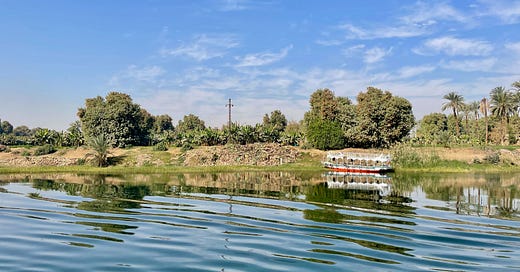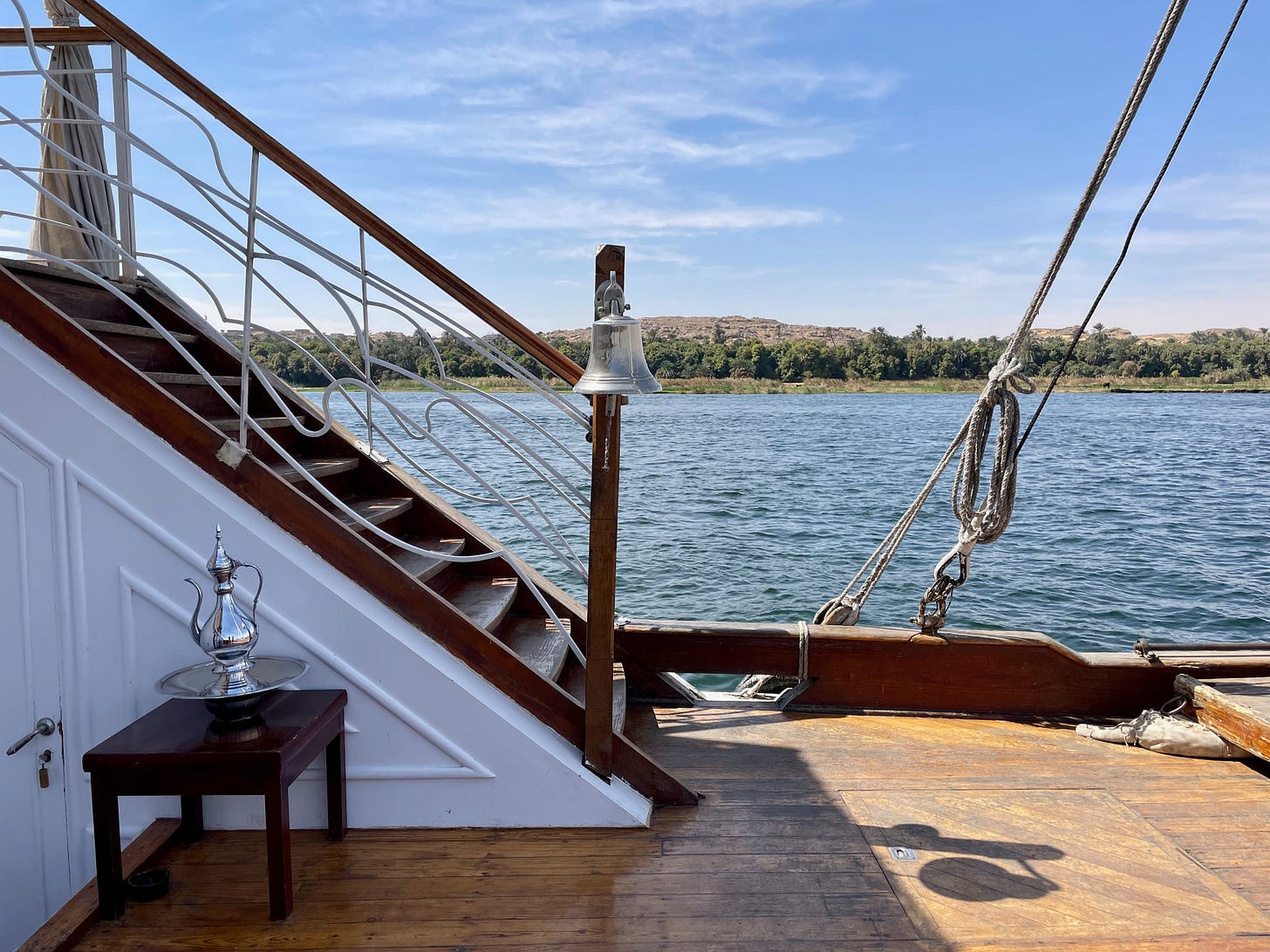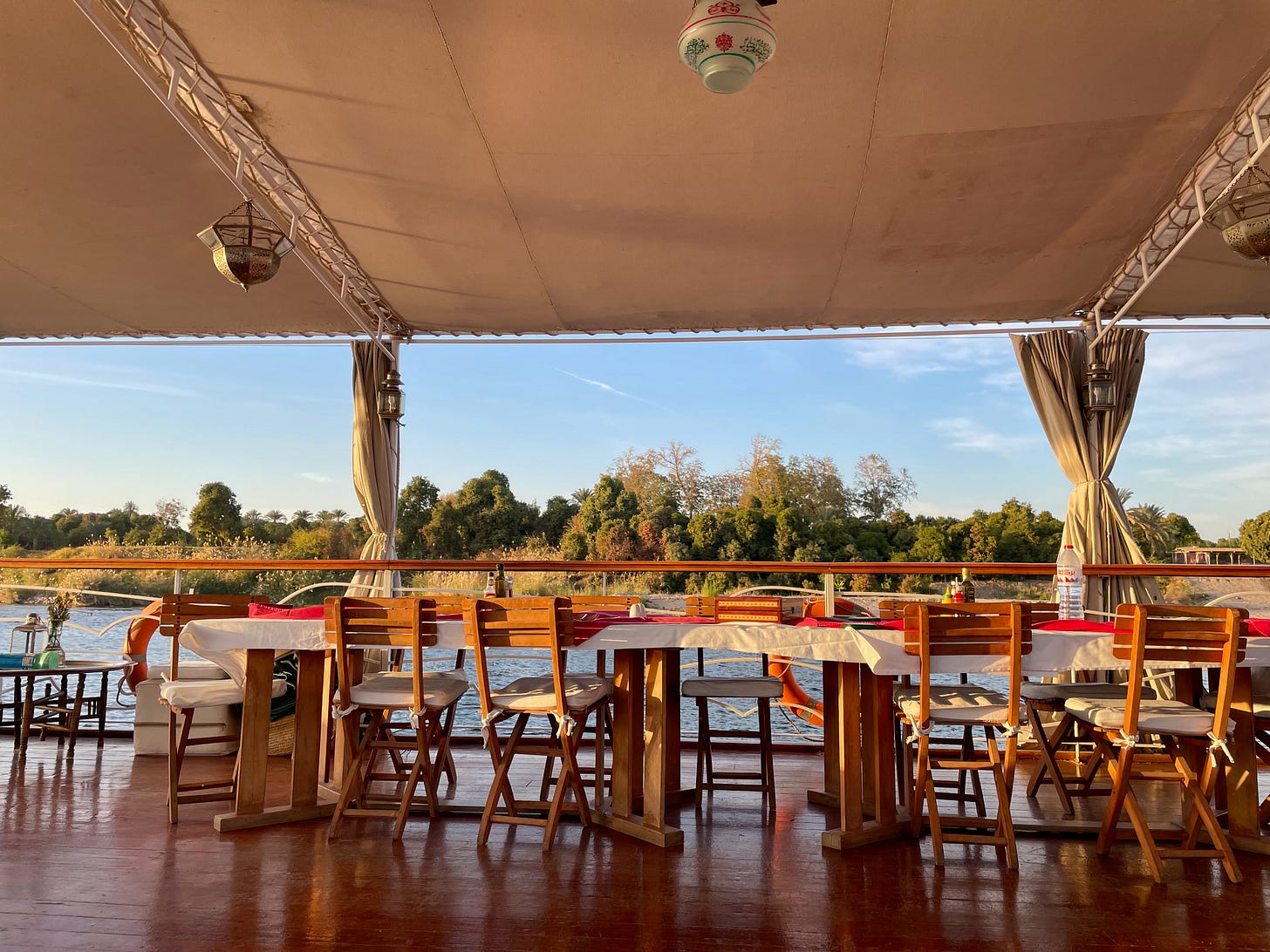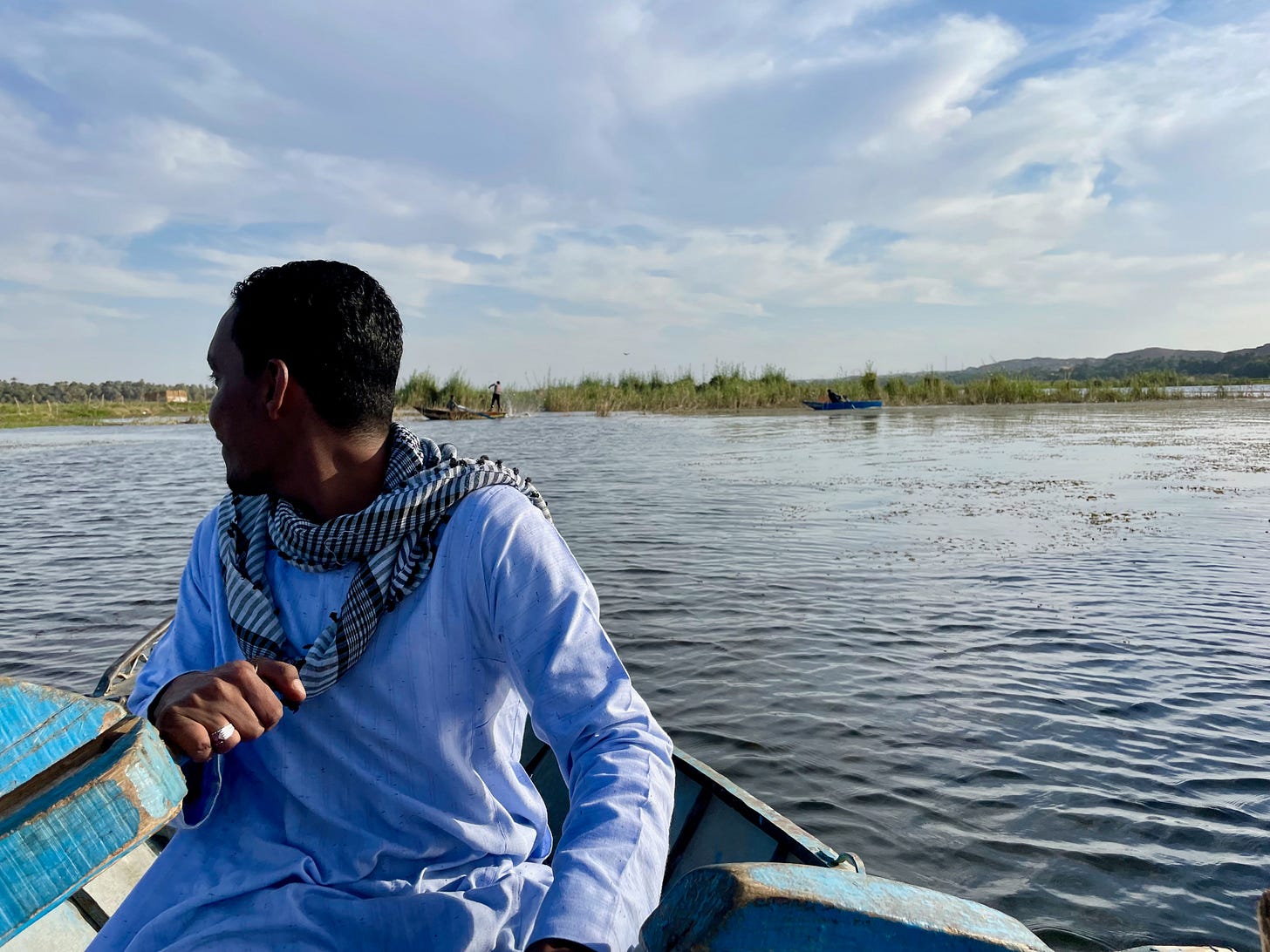Cruising Upper Egypt, or the Luxury of Simplicity
+ new paid subscription option and incredible photos, if I do say so myself
Friends! I hope you are having a wonderful week. Thank you so much for your lovely feedback after my last essay—I was wringing my hands before hitting “publish,” worried it wouldn’t resonate. What a relief to hear I was not alone in those feelings.
I want to thank
(author of, a very compelling travel newsletter you should read!) for pledging a paid subscription recently. With Mikey and’s votes of confidence, I’ve decided it’s finally time to offer a paid option. If you believe in what I’m doing, I hope you’ll consider upgrading. Paying for a subscription is like saying, “I enjoy this! More please!” and will ensure I can keep creating (because the sad truth is I can’t do this for free indefinitely).Nothing about the free subscriber experience will change for now—free subscribers will still get two newsletters from me every month—but paid subscribers will get a little something extra. Once a month, I’ll send paid subscribers a compilation of my meanderings: my prettiest photos, vignettes of life in Cairo, drink recipes from chez Childress, links to the best travel and memoir writing on the internet…i.e. all the stuff that I’m dying to share but that doesn’t easily fit into the essays I like to write. If that sounds like fun, you can upgrade by clicking below. I hope you’ll join me!
If you’d like to be a paid subscriber but it isn’t in your budget, shoot me an email. I can put you on the list at no charge. You can also support this publication without whipping out your credit card by sharing it with your friends. :)
Today, I want to share with you the cruise Nick and I took down the Nile—a trip I cannot recommend enough. We went with Lazuli, but I’ve also heard wonderful things about Nour el Nil. I like to think I’m decently well-traveled and I have done few things that hold a candle to this. Having lived in Egypt for well over a year now, I can tell you there is no better way to see this beautiful country.
Until next time,
Sam
The Nile is quiet in Upper Egypt, and the call to prayer, which wafted from a minaret hidden somewhere behind swaying pampas grass on the banks, was the only sound, turning the entire landscape into a house of worship. From the top deck of our sailboat, I watched the crew as they crouched on the bow below, foreheads touching threadbare oriental rugs. Their crisp cotton tunics billowed in the wind.
By staring, I was eavesdropping on a private conversation between the men and their god, and I knew I should politely turn away. Yet I was drawn by the image’s double meaning: they were worshipping on a river that was sacred long before men praised Allah. They knelt at the altar of life-giving water—the artery through which Egypt’s lifeblood courses, from whose clay the ancients said Khnum molded humans—and I thought if I got to spend my life like this, sailing through unspoiled country with the wind in my hair, I might feel compelled to pray five times a day, too.
My most stylish friends had raved about the Nile dahabiyas, the small white sailboats that cruise between Luxor and Aswan, which are said to be like floating five-star hotels. “Best vacation we’ve ever taken,” they gushed. “Not just in Egypt—anywhere. The cabins are just gorgeous. And the food! You wouldn’t believe the food.” The idea of the dahabiyas is to see Upper Egypt’s ancient sites in style and opulence. You sleep and take all your meals on the boat, sailing to attractions with a private guide, being waited on hand and foot. I stalked tour companies on Instagram and lusted over the luscious photos, which showed brass accents against bright white walls, richly woven textiles, and plates heaped high with meat and cheese, all against the tranquil backdrop of water. It was more than enough to sell me.
Nick and I flew to Aswan early on a Friday morning to begin our journey. Before boarding the dahabiya, we met our private guide, Abdullah—a slight man with a Coptic cross tattooed on the inside of his wrist—and he took us to the Temple of Horus on Philae Island. As we sipped coffee at the outdoor café overlooking the temple, Abdullah told us, “There is no one else joining us this weekend. It’s your boat, so we are on your schedule. We can do whatever you want.” We could hardly believe our luck. There should have been at least six cabins on board, and it was a holiday weekend. Yet somehow the stars had aligned for us.
As we stepped onto the boat—our boat—a crew member handed us fresh minted lemon juice. Another gave us cool, damp towels for our hands and faces while a third took our suitcases (I would realize later there were at least five more crew, all just for us). We followed as he rolled the bags to end of the hallway and revealed a room with a balcony over the water. Towels shaped like swans sat on the soft bed, and a water carafe of hand-blown glass waited to quench our thirst. Each detail was so lovingly considered that if it were not for the pieces of framed artwork swinging back and forth like metronomes, I would have thought we were in a family-run guesthouse rather than the hull of a river boat.
Lunch was served at a dining table on the covered top deck. As we climbed the stairs, I noticed we were being pulled downriver by a little blue tug, because while the Nile flows south to north, the wind blows north to south. We had not just one boat to ourselves, but two.
The deck itself was like a stylish open-air loft. I counted three seating areas, excluding the dining table—two Western-style couches with a coffee table, an arrangement of floor cushions on a kilim rug with a brass tea tray, and beach chairs unfolded near the railings to catch the afternoon sun. I looked up at the canvas ceiling, which was dotted with lanterns, and toward the stern, where there was a small bar and a billiards table. “I feel very pasha-like,” Nick whispered as we sat down to our meal. After we had stuffed ourselves with tajines of tender, saucy meat and flatbread still hot from the oven, we sailed for the temple at Kom Ombo, and Nick and I dozed in our cabin contentedly, watching the water cast glimmers on the ceiling.
The next morning, a beautiful breakfast was set out for us: breads, cheeses, sweet crepes with Nutella, Egyptian fried tameya and ful. We disembarked at the ancient quarries at Gebel-es-Silsila, where we roamed deserted cliffs in which the stonecutters had carved chapels. Then we sailed on, and in the afternoon we stopped in a small fishing village called Bassaw, a cluster of brightly-painted mud brick houses surrounded by canals and fields of banana trees.
Bassaw had a single mosque and a community event hall that doubled as a schoolhouse, outside of which was the only fresh water pump in the village. Outside each home was a little wooden bench with cardboard on the seat to serve as cushioning so the residents could welcome tired travelers.
Abdullah introduced us to Amir, a resident who spoke no English but had kind eyes, and who picked leaves from mint plants and lemon trees so we could crush them in our palms and inhale their aromas. Amir walked us through the village to his home. We smoked shisha on the roof with his parents, and Amir’s father told us stories from his childhood in Bassaw before the Aswan dam was built, how the whole village had to decamp to high ground each flood season, and how they had finally gotten electricity in the 1990s.
When the tobacco was spent, Amir took us out on his rowboat. There was no tug for us this time; Amir had each of us row in turn, the current resisting the oars as we dragged them. We stopped near the reeds in the middle of the river to watch two young men fish. They were slapping the water with a heavy stick and drumming on the sides of their rowboat, which drove the fish into waiting nets. Amir called over to ask how much they’d caught that day; not much, the men said.
It seemed like a hard life, but not a bad one. While we had the extravagance of the dahabiya, Bassaw offered fresh mint and clean air, along with straightforward work on the river and a luxurious silence punctuated only by sticks slapping the water.
Nick and I spent the rest of the weekend lounging on the top deck. We donned sunglasses and well-worn sweaters to protect us from the wind, then we’d curl up with books or play pool—or at least attempt to play, as the boat’s motion sent the balls rolling along unpredictable curves. Every few hours, Nick would call to the head waiter, “ya rayyis, itneen ahwa turkia,” and two Turkish coffees would appear, steaming and thick with sugar and sediment. There were no distractions from each other’s company, and there was nothing else to do but marvel at how fortunate we were to be together, soaking in sunlight and watching life go by on the banks of the river. It was the simplicity that I loved, and that I would be loathe to leave behind.
Then the last morning came. I watched the crew shuffle about, clearing our breakfast dishes and rolling our suitcases to the gangway. I realized I envied them. Long after I’d returned to Cairo—whose dirty beige buildings I could no longer believe existed in the same country as this place—the crew would still be here, directing the rudder at the stern and praying at the bow. They would be surrounded by blue skies and green thickets, wisp-like clouds and water smooth as glass.
I hoard the memory of those days jealously. I hold them in my heart like a child with a piece of candy hidden in her pocket, ready to take it out and taste it when life gets ugly. For a moment I lived in splendor—not the splendor of a private boat, but of calm, of purity, of clear sky and birdsong.
















This trip!
I sent this post to my Aunt Shirley, who replied: "WOW, that was spectacular. I enjoyed every bit of it, the pictures and especially her writings. 100% [circling hearts emoji] [100 emoji]" I agree!